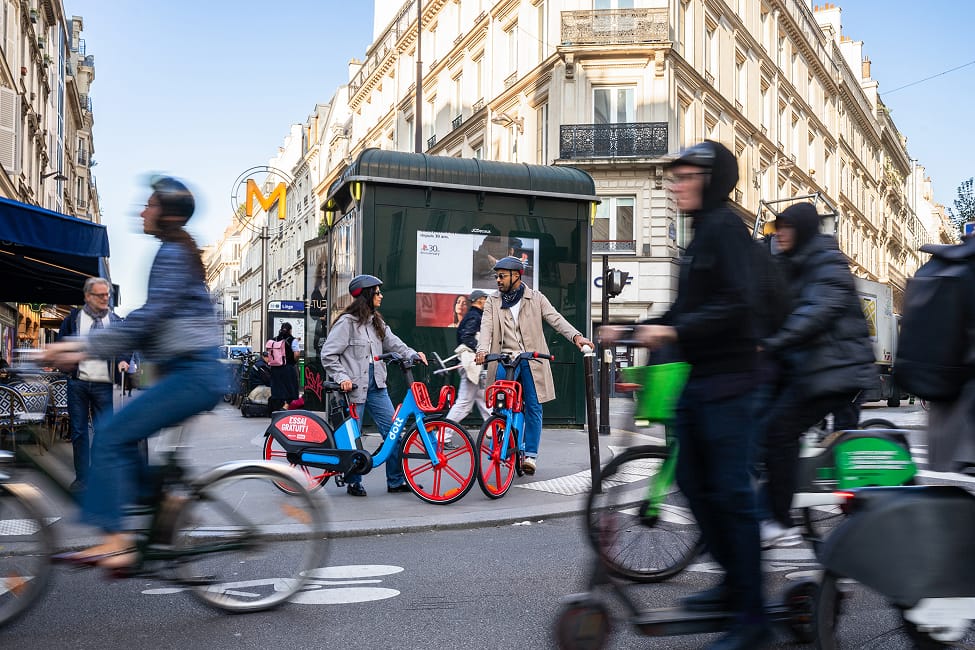Best-in-Class Partnerships and the Future of Shared E-Bike Fleets
Read about Segway and Dott's 'best-in-class' collaboration following Dott's contract renewal in Paris.

In partnership with Segway Commercial
This October, Paris began a new four-year cycle of dockless bike contracts with Dott, Lime and Voi. Far from just a routine contract renewal, this launch signals a structural shift in how cities, operators, and suppliers collaborate to deliver reliable, sustainable transport options.
For Dott and Voi, this milestone not only represents continued growth in one of Europe’s largest micromobility markets but also highlights the strategic role of ‘best-in-class partnerships’— exemplified by its ongoing collaboration with Segway to jointly develop and deploy a new generation of e-bikes tailored to Paris.
Paris: A Catalyst for Shared Mobility Maturity
Paris remains Europe’s bellwether for shared mobility innovation and regulation. The city’s strict new license requirements emphasize fleet uptime, environmental impact, and rider safety, underscoring a shift toward performance-driven standardization.
Without needing to talk too much about the station-based Velib’ system– which has long-been the pace-setter for bike-sharing schemes in Europe– cycling growth has been impressive. After the shared scooter ban came into effect in September 2023, dockless bike usage in Paris reached 19 million in 2024, up from 12.5 million in 2023. In 2024, however, there was the small subject of the Olympic Games, and Lime and Dott’s fleets were significantly larger (15,000+ at their peak) than the new limit of 6,000 for large parts of 2024 and 2025.
The new fleet caps and stricter parking rules require each operator to balance supply with quality and operational reliability under tighter city mandates.
Dott and Segway: Modular Collaboration Driving Performance
Dott’s partnership with Segway is a prime example of how best-in-class collaborations underpin effective shared e-bike deployments. Unlike fully vertically integrated models, this collaboration combines Segway’s global technology leadership, innovation capabilities, and supply chain strength alongside Dott’s operational expertise and data insights from millions of rides across Europe.
The new Segway Urban B200 e-bike, rolling out exclusively with Dott in Paris, is the product of this partnership—a vehicle engineered for Parisian conditions with enhanced durability, maintainability, and energy efficiency. This joint vehicle development strategy contributes directly to optimizing Total Cost of Ownership (TCO) by extending vehicle lifespan and reducing maintenance costs in one of the continent’s most demanding urban environments.
By tailoring features to Dott’s operational requirements and Paris’s regulatory framework, this specialized collaboration improves uptime, rider satisfaction, and sustainability—all critical success factors in competitive tenders focused on long-term service quality.
From All-In-One to Ecosystem models
Inadvertently, Paris has become a showcase for two different strategies in the shared mobility game. Dott has a more modular approach (best-in-class) to its operations. While Lime owns their vehicle supply chain and prefers in-house solutions (all-in-one). Whilst both operational models have their merits, it seems operators are increasingly choosing best-in-class partnerships that allow for greater agility, innovation, and strategic focus.
“For example, Segway’s technological innovation supports rapid deployment of new features and connected vehicle telemetry, a critical advantage for operators managing large urban fleets under Paris’s evolving requirements”.
– Zack Yan, Vice General Manager of the Commercial Mobility Business Division at Segway
A framework for innovation and sustainability
Segway’s role as a whole vehicle solution provider goes beyond manufacturing. Investments in energy-efficient battery systems, connected diagnostics, and predictive maintenance tools empower Dott to manage fleet performance and environmental impact. These capabilities align closely with Paris’s sustainability ambitions.
Riders benefit from durable, user-friendly bikes that reliably meet daily transport needs, supporting Paris’s vision that now sees over one in ten trips in central districts made by bike, a figure that has grown by 240% since 2018.
The low-down: Collaboration as the Cornerstone of Urban Mobility
“This Paris launch signals an ecosystem of dynamic, best-in-class partnerships. The Dott–Segway collaboration illustrates how vehicle solution provider-operator relationships can unlock operational efficiencies, innovate responsively, and meet evolving urban mobility challenges head-on”.
– Zack Yan, Vice General Manager of the Commercial Mobility Business Division at Segway
If other cities are to follow Paris’s lead with similar tenders, operators aligned with specialized technology partners will be well-positioned to achieve the cost, reliability, and sustainability benchmarks that define successful shared micromobility programs today.
For more on Segway Commercial’s initiatives, visit their official website.

